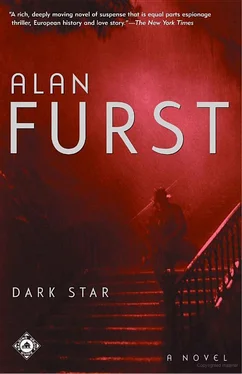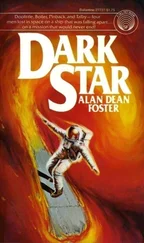Alan Furst - Dark Star
Здесь есть возможность читать онлайн «Alan Furst - Dark Star» весь текст электронной книги совершенно бесплатно (целиком полную версию без сокращений). В некоторых случаях можно слушать аудио, скачать через торрент в формате fb2 и присутствует краткое содержание. Жанр: Шпионский детектив, на английском языке. Описание произведения, (предисловие) а так же отзывы посетителей доступны на портале библиотеки ЛибКат.
- Название:Dark Star
- Автор:
- Жанр:
- Год:неизвестен
- ISBN:нет данных
- Рейтинг книги:3 / 5. Голосов: 1
-
Избранное:Добавить в избранное
- Отзывы:
-
Ваша оценка:
- 60
- 1
- 2
- 3
- 4
- 5
Dark Star: краткое содержание, описание и аннотация
Предлагаем к чтению аннотацию, описание, краткое содержание или предисловие (зависит от того, что написал сам автор книги «Dark Star»). Если вы не нашли необходимую информацию о книге — напишите в комментариях, мы постараемся отыскать её.
Dark Star — читать онлайн бесплатно полную книгу (весь текст) целиком
Ниже представлен текст книги, разбитый по страницам. Система сохранения места последней прочитанной страницы, позволяет с удобством читать онлайн бесплатно книгу «Dark Star», без необходимости каждый раз заново искать на чём Вы остановились. Поставьте закладку, и сможете в любой момент перейти на страницу, на которой закончили чтение.
Интервал:
Закладка:
He began to nod, confirming his observation: drunkards and perverts, dissolution and depravity. He put his hands on his broad hips and stared out at a Yugoslav colonel accompanied by a well-rouged girl in a shiny feather hat that hugged her head tightly. “Ja!” said Mottel Motkevich. There’s no doubt about you two. Likewise to a pair of pretty English boys in plus fours, then to a Captain of Industry caught in the act of schnozzling a sort of teenage dairymaid by his side.
Suddenly, a voice from the shadows in the back of the room: “But Mottel, why not?” Quickly the audience began to shout back at the comedian in a stew of European languages: “Is it bad?” “Why shouldn’t we?” “What can be so wrong?”
The fat man recoiled, grasped the velvet curtain with one hand, eyes and mouth widening with new understanding. “Ja?” You mean it’s really all right after all? To do just every sort of thing we all know about and some we haven’t figured out yet?
Now came the audience’s great moment. “Ja!” they cried out, again and again; even the waiters joined in.
Poor Mottel actually crumpled under the assault. A world he presumed to love, of order and rectitude, had been torn to shreds before his very eyes and now the truth lay bare. With regret, he bid all that fatuous old nonsense adieu. “Ja, ja,” he admitted ruefully, so it has always been, so it will always be, so, particularly so, will it be tonight.
Just then something extremely interesting caught his eye, something going on behind the curtain to his right, and, eyes glittering like a love-maddened satyr, he bequeathed his audience one final, drawn-out jaaa, then stomped off the stage to applause as the Companions struck up a circus melody and the zebras ran out from behind the curtain, bucking and neighing, pawing their little fore-hooves in the air.
Naked girls in papier-mache zebra masks, actually. Prancing and jiggling among the tables, stopping now and again to stick their bottoms out at the customers, then taking off again with a leap. After a few minutes they galloped away into the wings, the Companions swung into a sedate waltz, and the dancers soon reappeared, without masks and wearing gowns, as Animierdamen who were to flirt with the customers, sit on their laps, and tickle them into buying champagne by the bottle.
Szara’s was heavy-hipped, with hair dyed a lustrous, sinister black. “Can you guess which zebra was me? I was so very close to you!”
Later he went with her. To a secret room at the top of a cold house where you walked upstairs, then downstairs, across two courtyards where cats lived, finally to climb again, past blind turns and dark passageways, until you came to a low corridor under the roof gables.
“Zebra,” he called her; it made things simpler. He doubted he was the originator of the idea, for she seemed quite comfortable with it. She cantered and whinnied and shook her little white tummy-all for him.
His spirit soared, at last he’d found an island of pleasure in his particular sea of troubles. There were those, he knew, who would have found such sport sorrowful and mean, but what furies did they know? What waited for them on the other sides of doors?
The Zebra owned a little radio; it played static, and also a station that stayed on the air all night long, playing scratchy recordings of Schumann and Chopin from somewhere in the darkness of Central Europe, where insomnia had become something of a religion.
To this accompaniment they made great progress. And delighted themselves by feigning shock at having tumbled into such depths where anything at all may be found to swim. “Ah yes?” cried the Zebra, as though they’d happened on some new and complex amusement, never before attempted in the secret rooms of these cities, as though their daring to play the devil’s own games might stay his hand from that which they knew, by whatever obscure prescience, he meant to do to them all.
Warm and exhausted at last, they dozed off in the smoky room while the radio crackled, faded in and out, voices sometimes whispering to them in unknown languages.
The leaders of the Georgian khvost of the NKVD usually met for an hour or two on Sunday mornings in Alexei Agayan’s apartment on Tverskaya street. Beria himself never came-he was, in some sense, a conspiracy of one-but made his wishes known through Dershani, Agayan, or one of the others. Typically, only the Moscow-based officers attended the meeting, though comrades from the southeast republics stopped by from time to time.
They met in Agayan’s kitchen, large, dilapidated, and very warm, on 2 iNovember at eleven-thirty in the morning. Agayan, a short, dark-skinned man with a thick head of curly gray hair and an unruly mustache, wore an old cardigan sweater in keeping with the air of informality. Ismailov, a Russified Turk, and Dzakhalev, an Ossete-the Farsi-speaking tribe of the north Caucasus from whom Stalin’s mother was said to be descended-were red-eyed and a little tender from Saturday-night excesses. Terounian, from the city of Yerevan in Armenia, offered a small burlap sack of ripe pears brought to Moscow by his cousin, a locomotive engineer. These were laid out on the table by Stasia, Agayan’s young Russian wife, along with bowls of salted and sugared almonds, pine nuts, and a plate of Smyrna raisins. Agayan’s wife also served an endless succession of tiny cups of Turkish coffee, sekerli, the sweetest variety, throughout the meeting. Dershani, a Georgian, the most important among equals, was also the last to arrive. Such traditions were important to the khvost and they observed them scrupulously.
It was altogether a traditional sort of gathering, as though in a coffeehouse in Baku or Tashkent. They sat in their shirtsleeves and smoked, ate, and drank their coffees and took turns to speak-in Russian, their only common language-with respect for one another and with a sense of ceremony. What was said mattered, that was understood, they would have to stand by it.
Agayan, squinting in the rising smoke of a cigarette held in the center of his lips, spoke solemnly of comrades disappeared in the purges. The Ukrainian and Polish yidzh, he admitted, were getting much the worst of it, but many Georgians and Armenians and their allies from all over (some yidzh of their own, for that matter) had also vanished into the Lubyanka and the Lefortovo. Agayan sighed mournfully when he finished his report, all the eulogy many of them would ever have.
“One can only wonder …” Dzakhalev said.
Agayan’s shrug was eloquent. “It’s what he wants. As for me, I was not asked.” The nameless he in these conversations was always Stalin.
“Still,” Dzakhalev said, “Yassim Ferimovich was a superb officer.”
“And loyal,” Terounian added. At thirty-five, he was by far the youngest man in the room.
Agayan lit a new cigarette from the stub of the old one. “Nonetheless,” he said.
“You have heard what he said to Yezhov, in the matter of interrogation? ‘Beat and beat and beat.’ ” Terounian paused to let the felicity of that phrasing hang in the air, to make sure everyone understood he honored it. “Thus anyone will admit anything, will surely name his own mother.”
“Yours too,” Ismailov said.
Dershani raised his right hand a few inches off the table; the gesture meant enough and stopped Ismailov dead in his tracks. Dershani had the face of a hawk-sharp beak, glittering, lifeless eyes-thin lips, high forehead, hair that had gone gray when he was young-some said in a single night when he was sentenced to die. But he’d lived. Changed. Into something not quite a man. A specialist at obtaining confessions, a man whose hand was rumored to have “actually held the pliers.” Ismailov’s tone of voice was clearly not to his taste.
Читать дальшеИнтервал:
Закладка:
Похожие книги на «Dark Star»
Представляем Вашему вниманию похожие книги на «Dark Star» списком для выбора. Мы отобрали схожую по названию и смыслу литературу в надежде предоставить читателям больше вариантов отыскать новые, интересные, ещё непрочитанные произведения.
Обсуждение, отзывы о книге «Dark Star» и просто собственные мнения читателей. Оставьте ваши комментарии, напишите, что Вы думаете о произведении, его смысле или главных героях. Укажите что конкретно понравилось, а что нет, и почему Вы так считаете.












